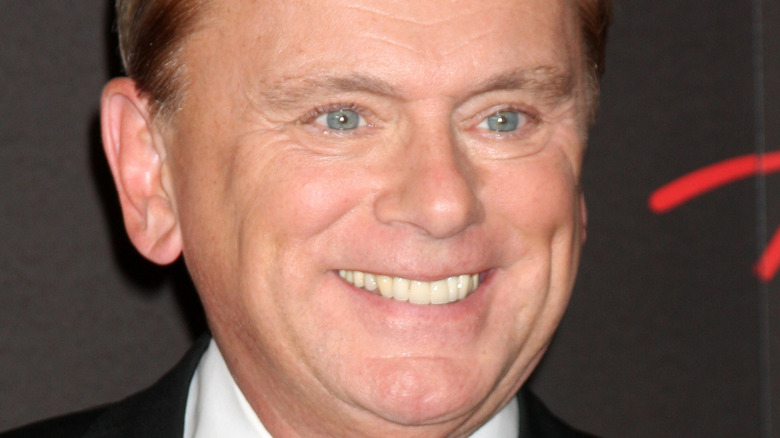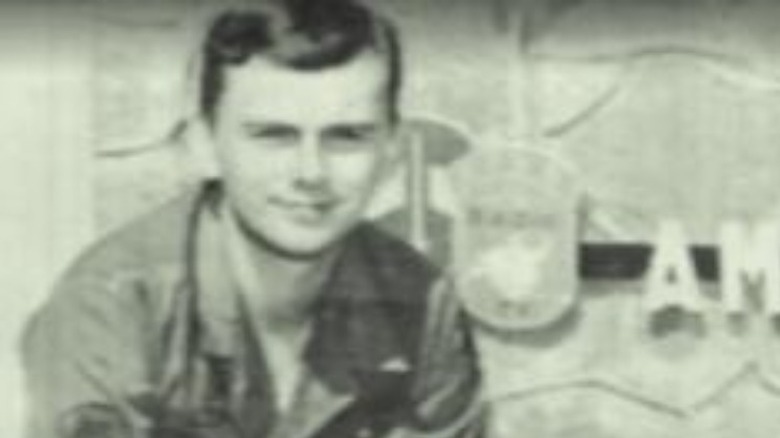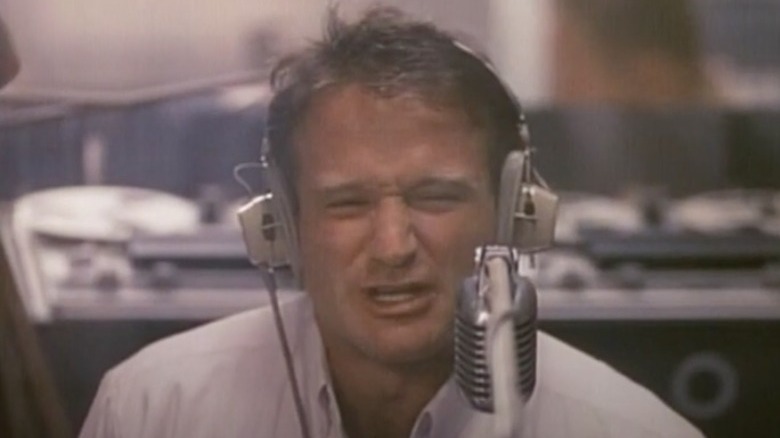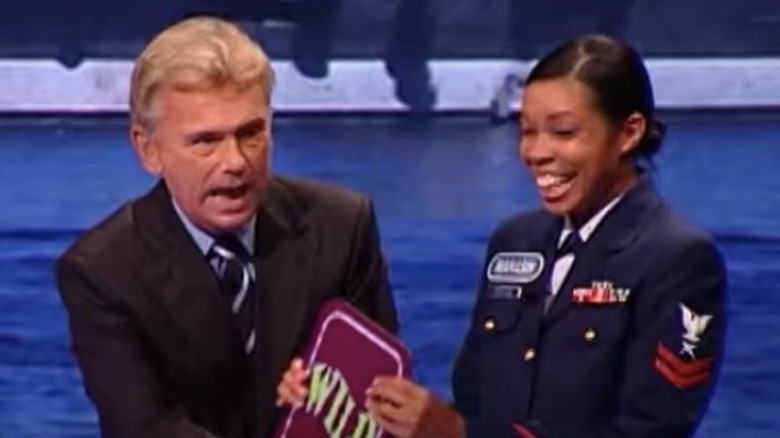What Pat Sajak Really Did Before His Wheel Of Fortune Gig
Have you ever watched Pat Sajak host "Wheel of Fortune" and wondered, what kind of training does it take to get a cushy job like that? Chat up the contestants. Walk them through a game guessing letters and solving word puzzles. Gain fame and fortune of your own while you're at it. According to Forbes, he earns a not-too-shabby salary of $15 million per year — which surely helped Pat Sajak secure an impressive net worth.
It's not all fun and games, of course. Like anyone in the spotlight, Sajak has come under fire at times. Viewers definitely didn't like it when a contestant used air time to talk about his severed toe (with the aim of publicly thanking the paramedics who helped him), and Sajak called the story "pointless" (via ET Canada). To his credit, however, Sajak has also made headlines for defending contestants, as he did when he used Twitter to call out viewers who mocked a trio of players who struggled to solve a puzzle.
Since joining "Wheel of Fortune" in the early 1980s, Sajak has shown he's a multifaceted figure who isn't afraid to let his opinions and personality shine through his image. Where does his confidence come from? We're willing to bet there are more than a few things you may not know about Pat Sajak. In fact, Sajak's story started long before he got his game show gig.
Sajak trained for the job as a teenager
Pat Sajak isn't from a family of celebrity entertainers. His father was a factory worker, and his mother worked occasionally in factories, too. She later remarried, and Sajak's stepfather held jobs as a dock worker unloading trucks. But Sajak knew early on that his future was elsewhere. It was in show business. "Radio and television seemed pretty cool to me," he said (via the Television Academy Foundation). "I envisioned it as an easy and fun way to make a living. It turned out I was right."
In high school, he took his moments to entertain his "audience," regularly giving teachers two sets of answers to tests — one of them always meant to be funny. His antics didn't land him in trouble, and he liked getting laughs. It was probably a good training ground for his first gig when he won a contest in 1965 and became a guest teen DJ on Chicago's Dick Biondi Show. It was his first broadcast work on the radio, and he thrived in the short-lived position. "I learned I liked it and I learned I had a facility for it," he said. "It certainly confirmed that was what I wanted to do."
After high school, Sajak went to Columbia College in Chicago to study broadcasting. He was excited to glean information from teachers who were actually working in the field he wanted to enter. One of them took Sajak under his wing and steered him to his first professional job, reading the news in English for a Spanish radio show. It wasn't the big time yet, but Sajak was in broadcasting and learning a lot about the world. So much, in fact, that he soon decided to take his life in a whole new direction.
He went off to war—and took his talents with him
In the late 1960s, reading the news meant absorbing breaking information about the ongoing Vietnam War. Soon, Sajak's mind was made up. In a "fit of patriotism," as he put it (via the Television Academy Foundation), he left college and joined the U.S. Army. It was a sharp pivot for a guy who'd been devoted to entertainment all his life.
Sajak went through basic training and was sent to Vietnam to work as a finance clerk. He was good at the job but soon pinned his hopes on working in Armed Forces Radio. Eventually, he was transferred to Saigon and took over the "Dawn Buster" show. At 6 a.m. each day, Sajak called out the now-famous tagline, "Good morning, Vietnam!" just like Robin Williams did while portraying real-life DJ Adrian Cronauer in the 1987 film of the same name. Sajak kept the show going for the next year.
"I used to feel a bit guilty about my relatively 'soft' duty," he said (via USO). After all, he wasn't actually fighting. He had comfortable living quarters in a hotel and nice restaurants nearby. Nevertheless, he served his country during a time of war and gave troops his gift, which they needed badly. "They're away from home and they're fighting a war. It's not a real pleasant situation," he told the Television Academy Foundation. "The idea was to create a situation where, when they turned on the radio, they felt as if they were at home."
It was the largest market Sajak had worked in, and his audience included U.S. troops, American civilians, and local Vietnamese people, too. When soldiers stopped by to thank him, he was heartened and humbled to know the show was having an impact.
He's famous now, but he's never forgotten his past
Toward the end of his service, Sajak worked in the Pentagon. When he was discharged in 1970, he figured he'd stick around Washington, D.C. and easily land a job in his chosen field. Instead, he found himself working at a hotel. After a year, he finally got a radio job in a small Kentucky town. But there wasn't much room for growth, so a year later he was on the move again, this time to Nashville.
Another hotel job sustained him while he looked for broadcast work. After much networking he wound up in television, where he started in a broadcast booth and eventually got on camera, reporting weather and sports. Sajak's work caught the attention of a Los Angeles station that scooped him up as a weatherman. Now he was getting somewhere.
Since L.A. weather is pretty consistent, Sajak devised creative ways to amuse his audience. One day, he nicked his face shaving before work and arrived with a Band-Aid on his face. To be funny, he started moving it each time the camera cut away. It just so happened producer Merv Griffin was watching at home and loved the bit. Griffin called Sajak, asked if he'd like to host his game show, and the rest is history.
On "Wheel of Fortune," Sajak has built an amazing career. But his favorite weeks at work still harken back to the Vietnam War. He appreciates the significance of that period in his youth and loves having military personnel and their families on the show. "My respect for those who serve has stayed with me throughout my life," he said. "My time in the military — particularly my time in Vietnam — are among those things in my life of which I'm most proud."



